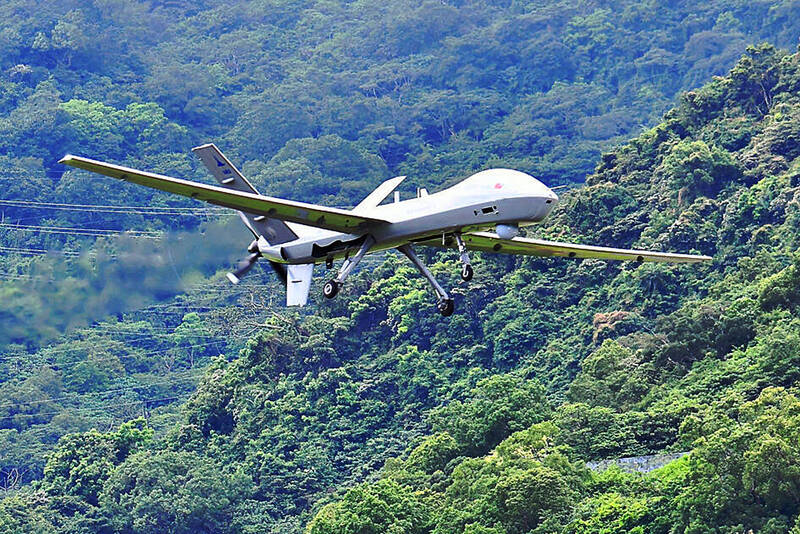The Ministry of National Defense plans to use a proposed aerospace and uncrewed aerial vehicle (UAV) industry campus to produce military drones, a defense official said yesterday.
The campus in Chiayi County’s Minsyong Township (民雄) would receive nearly NT$6.9 billion (US$216.12 million) to build factories, hangars and UAV testing facilities, the ministry’s budget proposal submitted last month to the Legislative Yuan showed.
The Chungshan Institute of Science and Technology, the ministry’s research and development arm, is to oversee the project, it said.

Photo: Yu Tai-lang, Taipei Times
Speaking on condition of anonymity, the defense official said the information disclosed by the report suggested that the campus would serve as the production center for drones, the military value of which has rapidly increased in the past few years.
The Teng Yun 2 (騰雲二型, “Cloud Rider 2”) and the Albatross II (銳鳶二型), the nation’s domestically developed medium-altitude long-endurance military drones, have passed operational tests, the official said, adding that the Teng Yun 2 last month participated in a live-fire precision-guided munition exercise.
The Albatross II reportedly performed well in the drills, although the armed forces have yet to issue a contract for mass production of the drone, they said.
The Chien Hsiang (劍翔, “Rising Sword”), a loitering munitions drone that targets radar systems, is believed to be slated for mass production next year, and would be funded through the regular budgetary process rather than the Sea-Air Combat Power Improvement Plan, they said.
The navy has also proposed a budget for the Hung Chueh 3 (紅雀三型, “Cardinal 3”) project to address flaws with its predecessor, the Hung Chueh 2 (紅雀二型), such as a lack of target designation capabilities, training simulators and dedicated trainer drones, the official said.
The Executive Yuan approved the drone budgets one day after approving a high-profile warship and submarine budget, which shows the urgency and importance that it has placed on improving the capabilities of the military’s UAVs, they said.
In May, the Cabinet approved the Five Trusted Industry Sectors development plan targeting chips, artificial intelligence, defense, security and surveillance, and next-generation communications.
The plan’s defense component includes funds to boost the nation’s UAV design and production capabilities with an emphasis on establishing supply chains outside of China, it said at the time.
The Executive Yuan’s 2028 targets for the drone industry include increasing the sector’s value 10-fold to NT$30 billion and a surge production capability of 15,000 systems a month.

A Ministry of Foreign Affairs official yesterday said that a delegation that visited China for an APEC meeting did not receive any kind of treatment that downgraded Taiwan’s sovereignty. Department of International Organizations Director-General Jonathan Sun (孫儉元) said that he and a group of ministry officials visited Shenzhen, China, to attend the APEC Informal Senior Officials’ Meeting last month. The trip went “smoothly and safely” for all Taiwanese delegates, as the Chinese side arranged the trip in accordance with long-standing practices, Sun said at the ministry’s weekly briefing. The Taiwanese group did not encounter any political suppression, he said. Sun made the remarks when

The Taiwanese passport ranked 33rd in a global listing of passports by convenience this month, rising three places from last month’s ranking, but matching its position in January last year. The Henley Passport Index, an international ranking of passports by the number of designations its holder can travel to without a visa, showed that the Taiwan passport enables holders to travel to 139 countries and territories without a visa. Singapore’s passport was ranked the most powerful with visa-free access to 192 destinations out of 227, according to the index published on Tuesday by UK-based migration investment consultancy firm Henley and Partners. Japan’s and

BROAD AGREEMENT: The two are nearing a trade deal to reduce Taiwan’s tariff to 15% and a commitment for TSMC to build five more fabs, a ‘New York Times’ report said Taiwan and the US have reached a broad consensus on a trade deal, the Executive Yuan’s Office of Trade Negotiations said yesterday, after a report said that Washington is set to reduce Taiwan’s tariff rate to 15 percent. The New York Times on Monday reported that the two nations are nearing a trade deal to reduce Taiwan’s tariff rate to 15 percent and commit Taiwan Semiconductor Manufacturing Co (TSMC, 台積電) to building at least five more facilities in the US. “The agreement, which has been under negotiation for months, is being legally scrubbed and could be announced this month,” the paper said,

Japan and the Philippines yesterday signed a defense pact that would allow the tax-free provision of ammunition, fuel, food and other necessities when their forces stage joint training to boost deterrence against China’s growing aggression in the region and to bolster their preparation for natural disasters. Japan has faced increasing political, trade and security tensions with China, which was angered by Japanese Prime Minister Sanae Takaichi’s remark that a Chinese attack on Taiwan would be a survival-threatening situation for Japan, triggering a military response. Japan and the Philippines have also had separate territorial conflicts with Beijing in the East and South China